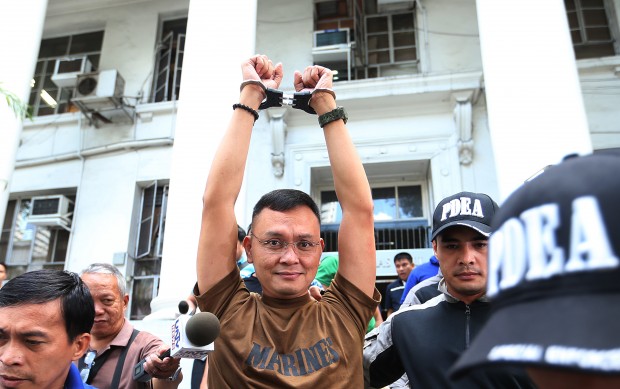DOJ drops P380M drug case vs Marcelino, Chinese cohort
The Department of Justice (DOJ) has withdrawn its P380-million drug case against intelligence officer Marine Lieutenant Colonel Ferdinand Marcelino and his Chinese companion Yan Yi Shou.
In a 13-page resolution signed by Justice Undersecretary Deo L. Marco, it affirmed the May 23, 2016 resolution of Senior Deputy State Prosecutor Theodore Villanueva stating that the evidence presented by the Philippine National Police (PNP) and the Philippine Drug Enforcement Agency (PDEA) is insufficient to charge them in court.
The recent DOJ resolution reverses the September 2016 DOJ ruling finding evidence that they should both be prosecuted for violation of Section 11 of the Comprehensive Dangerous Drugs Act for possession of illegal drugs.
READ: DOJ files drug raps vs ex-PDEA exec Marcelino, Chinese cohort
Marcelino and Yan were arrested in a drug bust on Felix Huertas Street in Manila on Jan. 21, 2016. They allegedly possessed 76,697.7 grams or P380-million worth of shabu.
Article continues after this advertisementMarcelino maintained his innocence, saying he was only in the area doing surveillance operations with his asset Yan.
Article continues after this advertisementHe was still arrested by authorities and slapped with a complaint before the DOJ.
Marcelino said the root cause of his arrest was because of PDEA Chief Arturo Cacdac was “historically irate” at his continued involvement in the government’s anti-drug campaign.
Marcelino filed a petition for bail before the Quezon City Regional Trial Court which was granted for lack of evidence.
QCRTC Judge Lyn Ebora Cacha said Marcelino was found on the ground floor where there were no illegal drugs.
The court added that the authorities failed to present proof that Marcelino had any knowledge or control of the illegal drugs found in the area.
READ: Military intel vouches for Marcelino
The court noted that Marcelino was found resting on a sofa when authorities arrived in the area.
“His mere presence at the house does not by itself make petitioner Marcelino liable as such is merely circumstantial which is yet to be connected to the crime.”
The QCRTC’s ruling was echoed by the DOJ in dismissing the complaint.
PNP and PDEA filed an appeal maintaining that they have presented a strong evidence to back up their complaint. They have also submitted a supplemental motion with additional evidence.
The DOJ then reversed its earlier finding and ordered the filing of a case for violation of Section 11 of the Comprehensive Dangerous Drugs Act before the Manila Court.
Then, on October last year, he agreed to testify on the Congressional inquiry on the drug proliferation inside the national penitentiary and against now detained Senator Leila De Lima. Congress has decided to forego with his testimony and decided to refer the matter to the House Committee on Public Safety.
Late last year, the Manila Court ordered the arrest of Marcelino and Yan. Marcelino surrendered before the Armed Forces of the Philippines while Yan surrendered at the National Bureau of Investigation (NBI).
Marcelino sought the lifting of the arrest warrant. At the same time, he filed a petition for review at the DOJ five months after the September resolution that charged him in court. Under the rules, a petition for review should be filed 15 days upon notice.
But the DOJ, in its recent ruling decided to forego with the rule “in the interest of justice.”
“A show of liberality is within the competence of the Secretary of Justice,” the resolution stated.
Aside from echoing the May 2016 resolution and the ruling of the Quezon City RTC, the DOJ took note of the January 2017 certification issued by the AFP through Brigadier General Ronald C. Villanueva and the 2016 certification of then NBI Director Virgilio Mendez. Both certifications recognized Marcelino’s active participation in anti-drug operations.
“Lt. Col. Marcelino and Yan Yi Shou have sufficiently proven that they were in performance of a lawful duty when they were chanced upon by the PNP and PDEA joint team, thereby negating the evidence of the complainants-appellees purportedly establishing that they are probably involved in the manufacture of illegal drugs, conspiracy in the manufacture thereof, or illegal possession of the same,” the DOJ stated. IDL/rga
